H.L. Mencken Collection
The Enoch Pratt Free Library is home to the world's foremost H. L. Mencken collection. It includes the books in Mencken's personal library, typescripts and proofs of Mencken articles and books, correspondence, and many other Mencken artifacts.
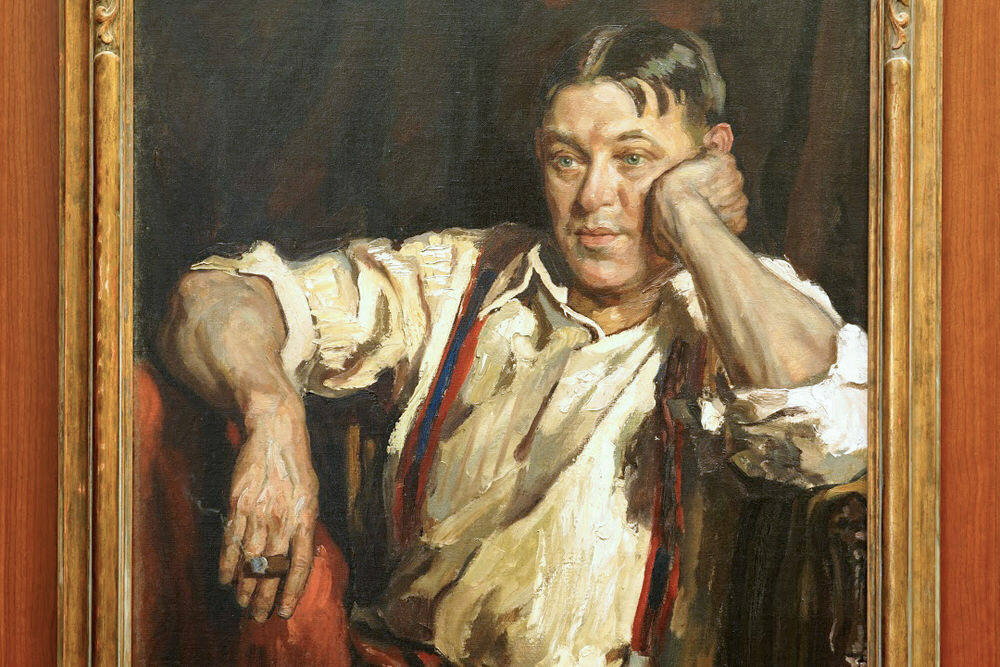
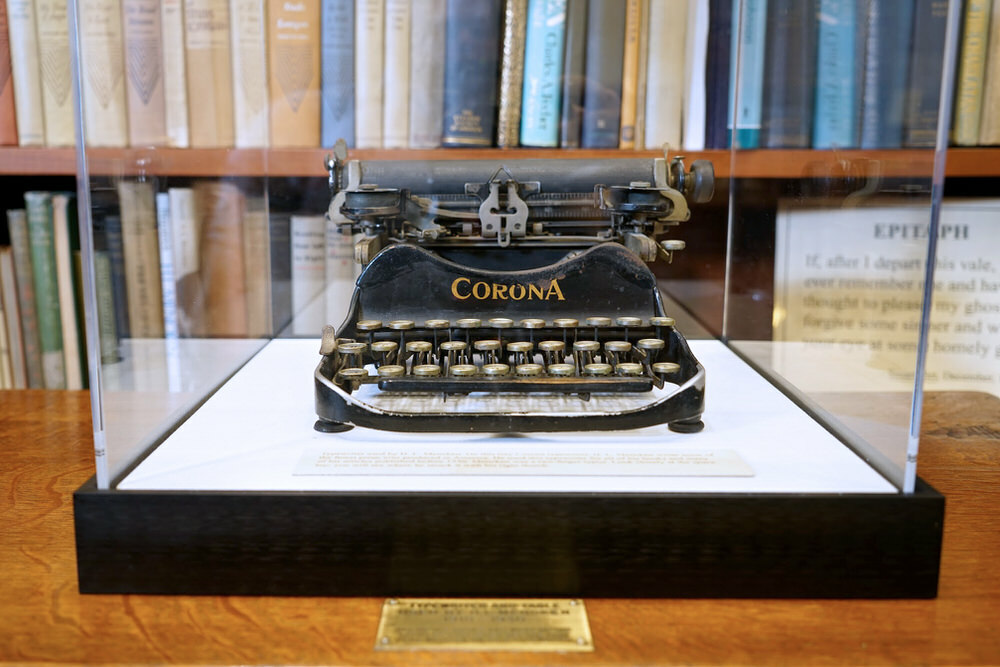
Mencken's Career
Henry Louis Mencken was born in Baltimore on September 12, 1880. After graduating from the Baltimore Polytechnic Institute in 1896, he worked in his family's cigar business until death of his father in 1899. Mencken began his journalistic career with The Baltimore Herald and joined the staff of The Baltimore Sun in 1906. In time, Mencken would become one of the most storied journalists in America. Many consider his coverage of the Scopes trial in 1925 to mark the zenith of this aspect of his career. Mencken's fame grew to such heights during the 1920s that it was suggested that he was the most powerful private citizen in America.
His reputation fell during the 1930s, as America suffered under the Depression. However, it ascended again with the tremendous success of the autobiographical trilogy: Happy Days (1940), Newspaper Days (1941), and Heathen Days (1943). Here, Mencken the mellow elegist mourns what America has lost but celebrates what his writing can preserve.
On November 23, 1948, Mencken suffered a severe stroke that robbed him of his ability to read and write, and his final seven years proved difficult. He died in his sleep of a heart attack early Sunday morning, January 29, 1956. His epitaph had first appeared in the December 1921 Smart Set, and, thankfully, Mencken never found reason to revise it. He talked not about himself or his writing but rather about people. In an unusually quiet voice, he asked for tolerance: "If, after I depart this vale, you ever remember me and have thought to please my ghost, forgive some sinner and wink your eye at some homely girl."
What happened here in Baltimore with Mencken is truly a remarkable story. This man who never went to school beyond the age of fifteen years and nine months taught himself to write and became one of the most distinguished stylists in prose nonfiction in the history of American letters. In his second floor study at 1524 Hollins Street, Mencken pecked away at his small Corona and produced prose which ranks with that of Mark Twain, Benjamin Franklin, Henry Adams, and Henry David Thoreau.
The Collection
The Mencken Collection is divided into several subject areas, with a complete catalog available from the Special Collections curator. In addition to browsing the physical collection, you can also explore the H.L. Mencken Digital Collection.
The Mencken collection was officially opened on April 17, 1956, under the curatorship of Betty Adler.
These early versions of H.L. Mencken's books exist in the form of manuscripts, typescripts, revised typescripts, galley proofs, and page proofs. Not all works survive in every state of publication but there is a wide representation of Mencken’s thought as it moves toward a finished work.
Notable volumes include "The American Language" (20 volumes), Mencken’s Autobiographical Trilogy ("Days of Innocence"), "Heliogabalus", "Menckeniana: A Schimpflexikon" (This title means “A Collection of Abuse.), "Prejudices", and "Treatise on the Gods."
Mencken as a Creative Writer
As a young man, before deciding that his talent lay in prose nonfiction, Mencken tried his hand at different kinds of writing, including an attempted novel set in Elizabethan England.
The Collection contains volumes of manuscripts and published materials from Mencken’s time as a short story writer, poet and dramatist. Notable volumes include Short Stories(1900–1906), Early Fiction Typescripts (1889–1903), published material in such magazines as Redbook Magazine, Frank Leslie’s Popular Monthly, The Bookman, and Short Stories, Poetry (1895), and Attempts at Plays (1909–1920).
Magazines
Mencken’s earliest magazine material dates from 1899. He began writing book reviews for The Smart Set in 1908, became co-editor in 1914, and continued until December 1923. Mencken began The American Mercury in January 1924 as co-editor, became sole editor in 1925, and remained until December 1933. This Collection holds manuscript materials and clippings from The Smart Set and The American Mercury as well as articles from other national publications such as The New Yorker, Esquire, The Nation, The New Republic, and Vanity Fair. Notable volumes include:
- The Smart Set (complete run during Mencken’s co-editorship)
- "Monthly Book Reviews" (November 1908–December 1923)
- The American Mercury (complete run during Mencken’s co-editorship and editorship)
- "Book Reviews"
- "Editorials"
- “The Hatrack Case” (9 volumes, including the legal documents generated by the case)
- Herbert Asbury’s story, named for an angular prostitute, appeared in the April 1926 American Mercury. It was attacked by the Boston Watch and Ward Society and proved to be the most important censorship case in Mencken’s career as a magazine editor.
- Miscellaneous magazine articles (16 volumes, including scrapbook material and newspaper articles)
Newspapers
Perhaps Mencken’s most important work was as a journalist. It is certainly how he saw himself and how his name came to be known nationally. He wrote famously about the Scopes Trial in Dayton, Tennessee during the summer of 1925. This Collection contains clippings, dispatches, and revised typescripts from Mencken's long career as a newspaperman. Notable volumes include:
- Baltimore Herald (Evening, Morning and Sunday editions, 1899–1906)
- Baltimore Evening News (June–July 1906)
- Baltimore Sun (1906–November 9, 1948, intermittent. Mencken’s last column was published on November 9, 1948. He suffered his debilitating stroke exactly two weeks later)
- “A Proposed New Constitution for Maryland” (April 12, 1937)
- Baltimore Evening Sun (April 18, 1910–1948, intermittent)
- “The Free Lance” (4 volumes) a daily appearing from 1911–1915. This was Mencken’s most important daily column.
- Monday Articles (15 volumes) Mencken’s most important weekly column ran from 1920–1938.
- Editorials and other writings.
- Campaign and Convention Coverage (4 volumes). Mencken covered his first convention in St. Louis in 1904 and his final in Philadelphia in 1948. He did not cover every campaign or convention in between.
- Series on Hopkins Hospital (1937); University of Maryland (1938)
- New York Evening Mail (1917–1918, containing two of Mencken’s most famous columns)
- “The Sahara of the Bozart” (November 13, 1917) attacks what Mencken viewed as the cultural sterility of the American South.
- “A Neglected Anniversary” (December 28, 1917) Mencken’s fabricated history of the bathtub. To this day it is sometimes reported as fact.
- New York American (1934–1936)
- Two volumes covering Mencken’s 1917 trip to Germany as a correspondent for the Baltimore Sun and Evening Sun.
- “Berlin February 1917”
- “Germany 1917” (scrapbook)
This collection contains comprehensive lists of Mencken's published works, including first American editions of Books by H.L. Mencken, a list of his Contributions to Books, a list of published collections of Mencken’s Correspondence, and a selection of Pamphlets.
H. L. Mencken began to subscribe to a clipping service in 1903, when he was twenty-three years old. This service collected all mentions of Mencken's name in newspapers and magazines. This is a wealth of well-organized material that greatly facilitates research, and covers over 110 years. View a PDF list of the full scrapbook inventory, including volume numbers and dates.
This collection has grown to 170 volumes, is arranged chronologically, and contains commentary on Mencken’s life and work including coverage of the Scopes Trial in 1925, his battle against censorship during the “Hatrack Case” in 1926, and his marriage in 1935 to Sara Haardt, which received national press coverage.
H.L. Mencken wrote well over 100,000 letters and, like his other writing, his correspondence ranged across many subjects. He discussed government and the law, philology and economics, politics (local, regional, national, and international), literature and music, and food and drink. A complete list of correspondents is in the Mencken Collection. A small selection of letters is also available in the H.L. Mencken Collection on Digital Maryland.
Personal Correspondence
Mencken had a wide range of contacts across Maryland. He wrote to authors, judges, senators, governors, physicians and artists, among others. The collection includes correspondence with A. Aubrey Bodine, Dr. Louis Cheslock, Gerald W. Johnson, Governor William P. Lane, Governor Theodore McKeldin, Judge Eugene O'Dunne, Governor Albert Ritchie, Walter Sondheim, and Senator Millard E. Tydings.
A large collection of Mencken's correspondence with non-Marylanders is in the New York Public Library, but this collection has letters from Theodore Dreiser, long-time love Marion Bloom, the poet George Sterling, and many others. The collection includes correspondence with Marquis Childs, William Feather, Edgar Kemler, Joseph Wood Krutch, Clare Leighton, George Sterling, Dorothy Taylor, Anthony Turano, and Burton Rascoe.
Additional Correspondence
- Alfred A. Knopf Correspondence: Knopf was Mencken's longtime publisher and good friend. This is a large collection that covers both their personal friendship as well as the business of two of the most powerful literary figures of the period. Covers the years 1919–1956.
- August Mencken Correspondence: H.L. Mencken's brother August was the youngest of the four Mencken siblings and was a successful engineer as well as editor and author. After H. L. Mencken's stroke in 1948, August retired to care for his brother full-time. This is an extensive collection that often references his brother.
- Mencken Family Correspondence: The Menckens were a close-knit family who corresponded frequently. This collection also includes postcards from family members.
This collection holds materials related to the Mencken family including books, memorabilia, family and genealogical documents, and an extensive photographic record of his life. The collection preserves family and business documents, such as he records of his father’s tobacco firm, family pictures, including several valuable portfolios of Mencken portraits and personal photos, and scrapbooks made by Mencken (particularly his Souvenirs of Childhood and Schooldays, 1880–1896), his wife Sara, and his brother August and his family.
The Family collection also contains copies of books authored by members of the Mencken family, from the works of German scholars of the 17th and 18th centuries to members of Mencken’s immediate family.
Mencken was among the most well-known and powerful literary critics of his day and he built a large personal library. As a critic, Mencken championed the likes of Theodore Dreiser and F. Scott Fitzgerald, and among the collection’s many treasures are presentation copies inscribed to Mencken and signed by many authors, including Fitzgerald’s The Great Gatsby and Dreiser’s An American Tragedy. Many volumes contained lively and highly personal inscriptions which, together with other letters of literary correspondence Mencken attached to individual volumes, have been removed for safety and preservation.
The collection also contains copies of books, pamphlets, and various biographical and critical works about Mencken’s life and work. These volumes were purchased by the library after his death. The collection continues to grow as more is written about H.L. Mencken.
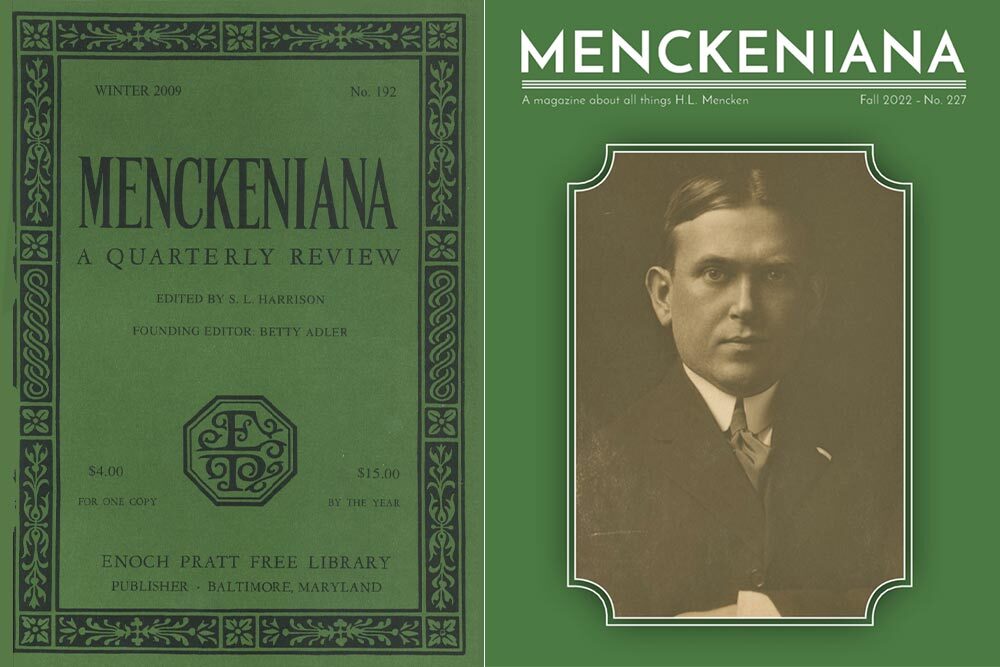
Menckeniana was an annual magazine devoted to the life and works of H.L. Mencken. It included stories, reminiscences, and scholarly articles about Mencken, and occasionally published some of his previously unpublished work. The final issue was published in December 2022.
Read Menckeniana through JSTOR. Free access to JSTOR is available with your Pratt Library Card.
Access the Collection
The Special Collections department is a non-circulating, closed stack area of the Enoch Pratt Free Library, but visitors and researchers are welcome during all open hours. For research purposes appointments are strongly recommended, and are available by request during the Central Library’s hours. To schedule an appointment call (443) 984-2451 or send an email to spc@prattlibrary.org.
Interested in visiting the Department? Read more about planning a visit and using the collections. The Department also offers photocopying and scanning services.
Online Access
Select items from the Mencken Collection are available online in Digital Maryland's H.L. Mencken Digital Collection. You can also use your library card to access free online research databases, such as Maryland newspaper archives.
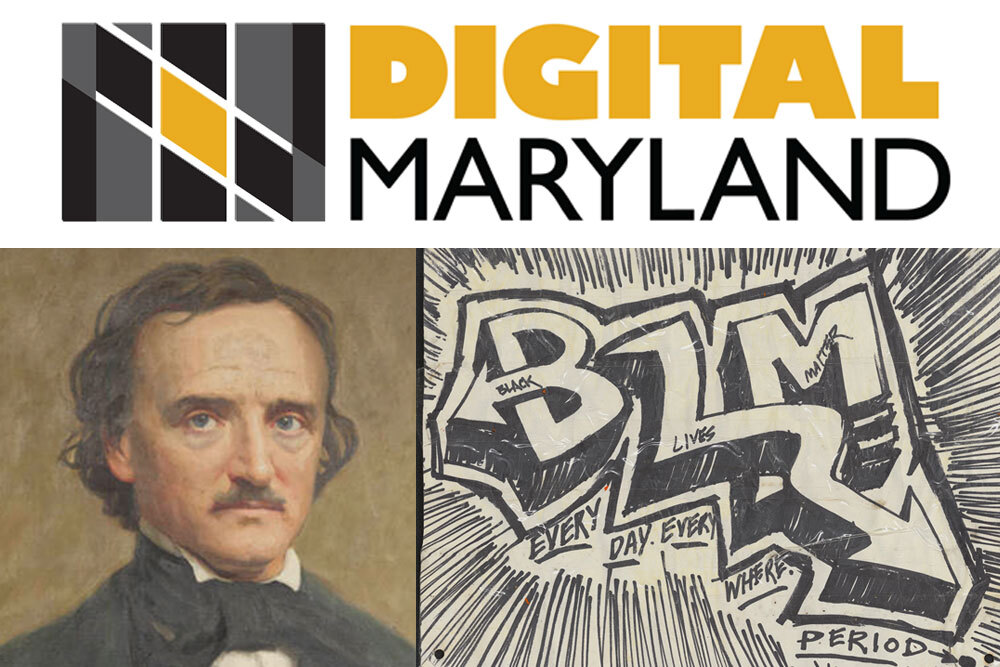
Digital Maryland
Digital Maryland is a collaborative, statewide program facilitating the digitization, digital preservation, and access to historical and cultural documents, images, audio, and video that record Maryland’s history.
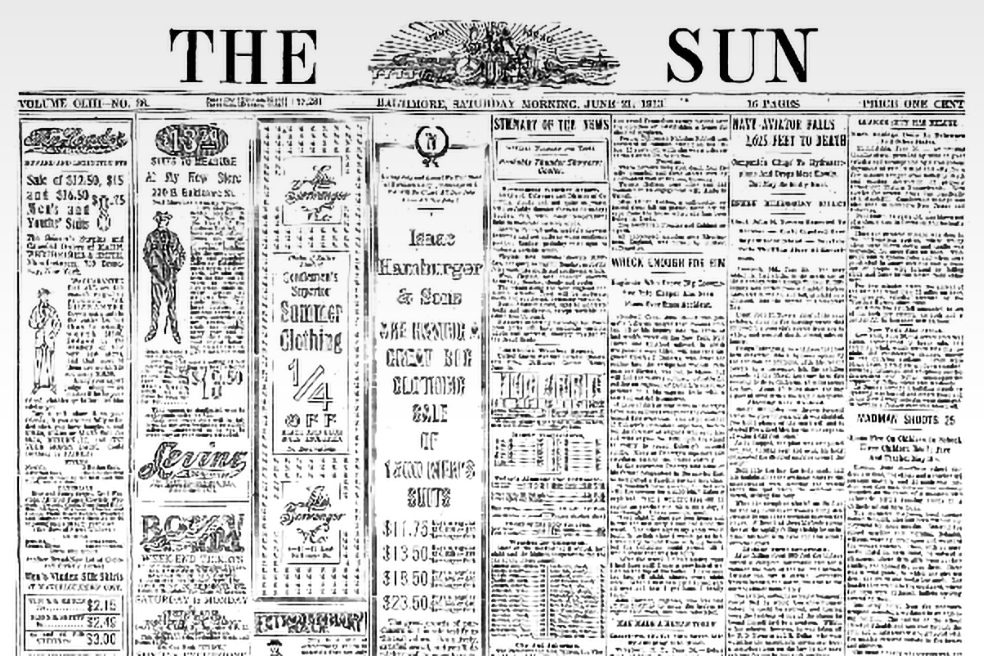
Periodicals Department
An in-depth, retrospective collection of newspapers, journals, and magazines in paper, microform, and online full-text formats.





